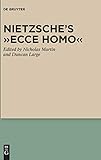Nietzsche’s “Ecce Homo” / ed. by Duncan Large, Nicholas Martin.
Material type: TextPublisher: Berlin ; Boston : De Gruyter, [2020]Copyright date: ©2021Description: 1 online resource (XII, 445 p.)Content type:
TextPublisher: Berlin ; Boston : De Gruyter, [2020]Copyright date: ©2021Description: 1 online resource (XII, 445 p.)Content type: - 9783110246544
- 9783110391664
- 9783110246551
- online - DeGruyter
- Issued also in print.
| Item type | Current library | Call number | URL | Status | Notes | Barcode | |
|---|---|---|---|---|---|---|---|
 eBook
eBook
|
Biblioteca "Angelicum" Pont. Univ. S.Tommaso d'Aquino Nuvola online | online - DeGruyter (Browse shelf(Opens below)) | Online access | Not for loan (Accesso limitato) | Accesso per gli utenti autorizzati / Access for authorized users | (dgr)9783110246551 |
Frontmatter -- Acknowledgements -- Table of Contents -- Abbreviations -- Editors’ Introduction -- Nietzsche’s Perfect Day -- I. Ecce Homo: Autobiography and Subjectivity -- Self-Knowledge in Narrative Autobiography -- “How One Becomes What One Is” -- Ecce Homo and Augustine’s Confessions -- How One Becomes What One Is -- Ecce Homo: Philosophical Autobiography in the Flesh -- II. Specific Concepts in Ecce Homo -- Ecce Homo and Nietzsche’s Concept of Character -- Ecce Homo as Nietzsche’s Honest Lie -- “[K]ein Nordwind bin ich reifen Feigen” -- Lost in Translation: or Rhubarb, Rhubarb! -- III. Ecce Homo in Relation to Nietzsche’s Other Writings -- Self-Becoming, Culture and Education -- Ecce Superhomo -- The Roles of Zarathustra and Dionysos in Nietzsche’s Ecce Homo and Late Philosophy -- IV. Revaluation and Revolution -- From “Saint” to “Satyr” -- “Ecrasez l’infâme!” -- A “Foretaste” of Revaluation -- V. Inspiration, Madness and Extremity -- Nietzsche’s Inspiration -- Apocalyptic ‘Madness’ -- Podachs zusammengebrochenes Werk -- “The Magic of the Extreme” -- Nietzsche’s Self-Evaluation as the Destiny of Philosophy and Humanity -- Bibliography -- Notes on Contributors -- Index
restricted access online access with authorization star
http://purl.org/coar/access_right/c_16ec
Friedrich Nietzsche’s intellectual autobiography Ecce Homo has always been a controversial book. Nietzsche prepared it for publication just before he became incurably insane in early 1889, but it was held back until after his death, and finally appeared only in 1908. For much of the first century of its reception, Ecce Homo met with a sceptical response and was viewed as merely a testament to its author’s incipient madness. This was hardly surprising, since he is deliberately outrageous with the ‘megalomaniacal’ self-advertisement of his chapter titles, and brazenly claims ‘I am not a man, I am dynamite’ as he attempts to explode one preconception after another in the Western philosophical tradition. In recent decades there has been increased interest in the work, especially in the English-speaking world, but the present volume is the first collection of essays in any language devoted to the work. Most of the essays are selected from the proceedings of an international conference held in London to mark the centenary of the first publication of Ecce Homo in 2008. They are supplemented by a number of specially commissioned essays. Contributors include established and emerging Nietzsche scholars from the UK and USA, Germany and France, Portugal, Sweden and the Netherlands.
Issued also in print.
Mode of access: Internet via World Wide Web.
In English.
Description based on online resource; title from PDF title page (publisher's Web site, viewed 01. Dez 2022)


